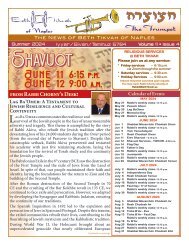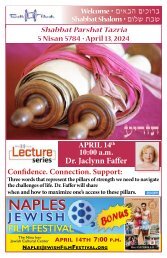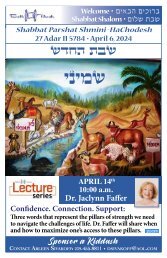You also want an ePaper? Increase the reach of your titles
YUMPU automatically turns print PDFs into web optimized ePapers that Google loves.
distance, as per a verse from Jeremiah, “Their tongue is a sharpened arrow”<br />
(9:7). Evil speech can harm even those who are not in the immediate vicinity,<br />
because gossip travels quickly. Likewise evil speech also carries with it an element<br />
of death’s irreversibility, because words, once spoken, can never be fully retracted.<br />
The Talmud teaches that if a person speaks ill of another, God declares, “He [the<br />
slanderer] and I cannot dwell together in this world.” God cannot bear<br />
to live in the world with a person who speaks inappropriately, and thus such a<br />
person must be cast out. This is a fitting response given that slander so often leads<br />
to the ostracism of the person slandered. The leper, too, is cast out of the camp<br />
and forced to dwell apart from the rest of the nation on the outskirts of society.<br />
He may return only after the priest examines the leper, cleanses him, and declares<br />
him pure. At that point he must bring two birds, one of which is set free and one of<br />
which is slaughtered, its blood mixed with cedar wood and hyssop and sprinkled<br />
over the leper. The rabbis explain that since this individual committed a sin by<br />
chattering too much, his purification involves bringing two birds who chirp and<br />
chatter incessantly.<br />
The rabbis caution that evil speech is so dangerous that one should not even speak<br />
well of another person in the presence of others, because in speaking about his<br />
goodness, one might come to speak of that person in a derogatory manner. They<br />
illustrate this point by means of a story about Rav Dimi, who once fell ill (Erchin 16a).<br />
His brother Rav Safra went to visit him, and when he arrived, Rav Dimi boasted<br />
to all those present, “I have merit coming to me, for I have fulfilled everything<br />
the sages said!” Rav Safra asked him, “But have you fulfilled the command not<br />
even to speak of the goodness of a person in the presence of others, because doing<br />
so may lead others to speak of him derogatorily?” Rav Dimi had to admit that<br />
no, he did not fulfill this dictum. In this story, which presumably was meant to be<br />
not just ironic but also humorous, Rav Dimi speaks well of himself, which leads<br />
to him having to admit to his own failings. Even when we offer words of praise<br />
about someone, we run the risk of speaking ill of them because we open them up<br />
to critique. Better not to talk about other people at all.<br />
And yet it is clear that according to the rabbinic understanding, the antidote to<br />
evil speech is not silence. The rabbis tell the story of Rabbi Yannai, who once met<br />
a peddler hawking an elixir of life (Leviticus Rabbah 16:2). Rabbi Yannai was eager for<br />
a sample. But the peddler was quick to assure him that he didn’t need his wares,<br />
because he was already in possession of them. He showed Rabbi Yannai a verse<br />
from Psalms: “Who is the man who desires life?... Keep your tongue from evil and<br />
your lips from lies. Turn from evil and do good; seek peace and pursue it.” (Psalms<br />
34:12-14). The term used in this story for peddler, rochel, comes from the same root<br />
as the word used in the Torah for slander, rechilut, and indeed, as Rav Nachman’s<br />
wife Yalta explicitly declares, “Gossip comes from peddlers” (Berakhot 51b). But in<br />
this story it is the peddler who reminds Rabbi Yannai that the key to living a long<br />
life is to avoid speaking ill and to perform good deeds. If Rabbi Yannai heeds the<br />
message of the verse from Psalms—and presumably other words of Torah as well—<br />
he will not speak ill of others and will thus merit long life.<br />
“Oh how I love your Torah,” declares the Psalmist, “It is what I speak all day<br />
long” (Psalms 119:97). When confronted with pauses in a conversation or awkward


















